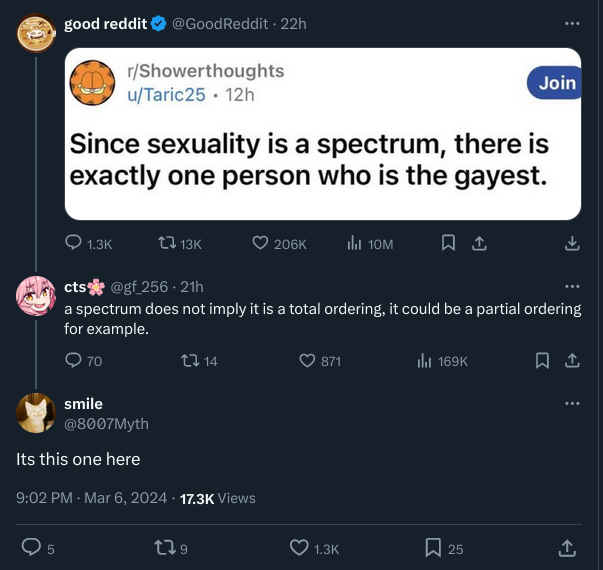this post was submitted on 27 May 2024
962 points (100.0% liked)
196
16238 readers
1925 users here now
Be sure to follow the rule before you head out.
Rule: You must post before you leave.
founded 1 year ago
MODERATORS
you are viewing a single comment's thread
view the rest of the comments
view the rest of the comments

The axiom of choice allows to duplicate a sphere...
I know mathematicians tend to approve of it, but the naturalist in me knows it's bullshit.
By performing measure-preserving transformations to non-measurable sets and acting surprised when at the end of the day measure isn't preserved. I don't blame AC for that. AC only implies the existence of a non-measurable set, which is in itself not totally counter-intuitive.
Yeah, I'm really out of my element talking about these abstract mathematical topics... I'm too much of an empirical scientist it seems!
Give me a set and I'll find a way to measure it! ...actually I'd like to know what's the mathematical definition of measurement, there's probably a trick there... 🤔
Measure theory gets pretty abstract, so I recommend using a source thats not me. For the Real Numbers, the standard measure (usually the Lebesgue measure) is a way to generalize notions of lengths of intervals to sets that are not intervals or easy unions of intervals. For any set E, we can find various sequences of open intervals (potentially infinitely many intervals) whose union will contain E. The Lebesgue outer measure of E is defined as the infimum of the sum of the lengths of those sequences of intervals (infimum is similar to minimum except that an infimum may not actually be attained). The set E is considered Lebesgue measurable if it satisfies am additional criterion (Caratheodory criterion) in which case the Lebesgue measure is equal to the Lebesgue outer measure. If E does not satisfy that criterion, then it is non-measurable. A measure has desirable certain properties that an outer measure does not satisfy, which is why we prefer the former. Apologies to all math people for any inaccuracies in the above description, it's been a while.